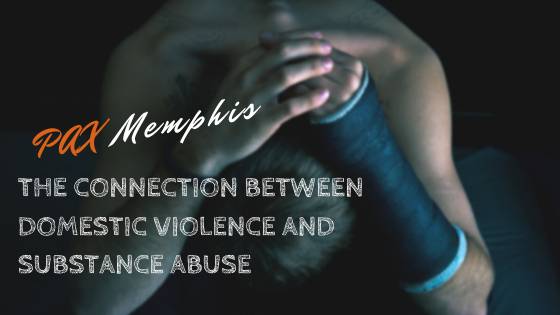The progression of drug and alcohol addiction is slow and often insidious, much like the progression of domestic violence. When the signs and symptoms of substance abuse and domestic violence are left unchecked, there can be devastating impacts and potentially fatal consequences for the addict. Much like addiction, domestic violence affects millions of Americans each year. Domestic violence is defined as a pattern of behavior within a relationship that is used by a partner or spouse to maintain control over an individual causing physical, sexual, and psychological harm. There are many different types of violence and abuse, some may include:
- Physical
- Mental
- Sexual
- Financial
Individuals who have experienced domestic violence may feel hopeless and turn to substances to cope with the abuse. When combined with drugs, alcohol, and substance use disorder, domestic violence can escalate to an even more dangerous situation.
Making the Connection: Domestic Violence and Addiction
Domestic violence and substance abuse are complex issues that are often intertwined and occur simultaneously. Much like the relations between co-occurring mental disorders and substance abuse, these two issues often go hand-in-hand. The Journal of Studies on Alcohol and Drugs found that before seeking treatment for substance abuse, the rate of violent acts was as high as 72% for men and 50% among women. Additionally, studies also found that aggression between two individuals in an intimate relationship was directly correlated with heavy drinking and cocaine use.
According to the Centers for Disease Control and Prevention (CDC) every minute, in the U.S., an average of 20 people are physically abused by a domestic partner. This number equates to more than 10 million people per year. Furthermore, victims of domestic violence often turn to substance abuse. In fact, women who have been abused are 15 times more likely to abuse alcohol and 9 times more likely to abuse drugs.
Substance abuse is often a shared affliction between domestic violence perpetrators as well as the victims of abuse. According to the American Psychological Association, excessive drug or alcohol use increases the risk of being a victim of domestic violence and of becoming an abuser. Addiction can impair an individual’s cognitive function while also increasing a person’s chances of becoming abusive. Victims may try to numb the mental anguish of domestic violence by turning to dangerous substances. Substance abuse often plays a facilitative role in violent behavior and often exacerbates pre-existing patterns of abuse.
Causes of Domestic Violence and Substance Abuse
Many factors contribute to the development of domestic violence and addiction. Whether it be biological, psychological, or socially driven, anger and unhealed trauma can grow and provoke individuals to look for unhealthy ways of coping. Some factors may include:
- Mental health disorders – Numerous mental health disorders such as bipolar disorder, anxiety, depression, borderline personality disorder, and many others can lead to substance abuse issues as well as domestic violence.
- Victims of abuse – Children who witness or who are victims of domestic violence may turn to substances to cope later in life. Many of these individuals may learn that violence is an acceptable way to resolve conflict and become abusers later in life.
- Low self-esteem – Perpetrators of domestic violence often have extremely low self-esteem, extreme jealousy, or lack of self-control when they feel inferior to their partner. This often leads to abuse and substance abuse.
- Trauma – Unresolved trauma such as PTSD can lead to domestic violence and substance abuse. Many individuals cope with trauma in various ways, adopting maladaptive behaviors such as domestic violence and addiction.
Signs of Domestic Violence
If you have a family member or loved one that is a victim of domestic violence, it is not always easy for them to admit to the abuse. There is a multitude of factors that contribute to the victims of domestic violence to speak out against their abusers. Often times, these people continue to stay in their abusive relationships out of fear for the safety of their children, concerns of guilt, financial insecurity, and fear of further abuse. No matter the situation, it is important for loved ones to understand and recognize the warning signs and symptoms behind the behaviors of a victim of domestic violence.
Some warning signs or symptoms of domestic violence may include:
- Low self-esteem
- Depression
- Anxiety
- Ptsd
- Avoiding important events such as work, school, or social engagements
- Blaming themselves for conflicts with their partners and making excuses for their partner’s reckless behaviors
- Minimizing arguments and altercations
- Fabrications of stories of accidental injuries to explain bruises, scratch marks, and other wounds
- Making excuses to stay with their partner while justifying their behavior
- Acting nervous or “walking on eggshells” around their partner
- Describing their partner or spouse as jealous or possessive
- Incessant contact and communication with partner or spouse about what they are doing at all times
Treatment for Domestic Violence and Addiction
It is especially vital for individuals who are suffering from domestic violence and addiction to treat both issues simultaneously and address any underlying co-occurring disorders. There are many specialized dual-diagnosis treatment programs for victims of domestic violence and addiction that will address co-occurring disorders such as trauma, anger management, and many other symptoms of abuse and addiction. Substance abuse rehab programs provide a safe, confidential space for those in need of addressing private and important issues inherent to creating healthy relationships in recovery, gaining overall health, and maintaining sustainable recovery.
Medically Reviewed: September 25, 2019

All of the information on this page has been reviewed and verified by a certified addiction professional.










